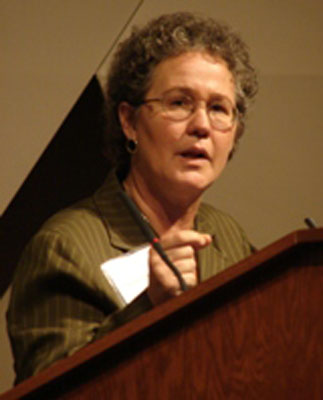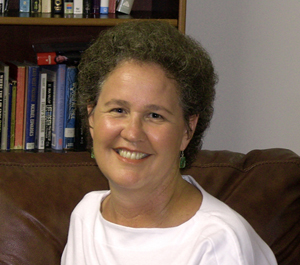School Leadership 2.0
A Network Connecting School Leaders From Around The Globe
The Education Debate 2012 -- Linda Darling-Hammond
The Global Search for Education: The Education Debate 2012 -- Linda Darling-Hammond

More than 8 in 10 Americans say education is an issue that is extremely or very important to them, according to an Associated Press-GfK poll earlier this year. Only the economy ranked higher. While the primary responsibility for education lies with state and local governments, the federal government awards billions of dollars in education aid. During the past four weeks in the Global Search for Education -- The Education Debate 2012, Howard Gardner, Richard Riley, Diane Ravitch and Andy Hargreaves have shared their perspectives on the issues the next President will face. Today it is my honor to introduce the fifth and last education luminary in our Education Debate 2012 series, Linda Darling-Hammond.
Linda Darling-Hammond is Charles E. Ducommun Professor of Education at Stanford University where she launched the Stanford Center for Opportunity Policy in Education and the School Redesign Network and served as faculty sponsor for the Stanford Teacher Education Program. She is a former president of the American Educational Research Association and member of the National Academy of Education. In 2006, Darling-Hammond was named one of the nation's 10 most influential people affecting educational policy over the last decade. In 2008-09, she headed President Barack Obama's education policy transition team. President Obama owns a copy of her best-selling book, The Flat World and Education: How America's Commitment to Equity Will Determine our Future.
What should the role of federal government be in K- 12 education? How much more funding should be given to education reform and in what major areas should it be spent?
The role of the federal government should be to first, protect civil rights and promote equity in access to education; second, collect data and report on the condition of education; third, develop and disseminate knowledge about learning, effective teaching and schooling; and fourth, plan for and support a high-quality education workforce.
The federal role should not be to try to run schools from afar, to prescribe what programs or strategies schools should use, or to seek to administer a prescriptive accountability system like that mandated by No Child Left Behind.
First, there is a crucial role in ensuring that rights are respected -- that students of all backgrounds have access to publicly provided education on equal terms and that they are treated fairly. Federal efforts to rectify the results of segregation, to require that sports and other learning activities for boys and girls are equitably offered, to ensure access to learning for students with disabilities, and to end discriminatory suspensions and expulsions are all part of this important mission. The Elementary and Secondary Education Act's investments in education for low-income students, new English learners, and migrant students are also an essential part of this important agenda, as are provisions that these students should have equitable access to well-qualified teachers. Another critical aspect of providing equal educational opportunity is ensuring universal access to high-quality early learning opportunities as most high-achieving nations do.
Next, there is a long-established federal role in collecting data and statistics and supporting basic research. The work of the National Center for Education Statistics and the National Assessment of Educational Progress helps us track what schools are doing, who they are serving, and what their outcomes are. In addition, we need research to guide informed investments and improvement strategies. When it comes to brain science, language acquisition, or the impact of computer-assisted tutoring, there's a crucial role for high-quality federal research to inform the efforts of everyone from teachers to school boards and state agencies. Policymakers and school practitioners need knowledge about teaching, student learning, curriculum, assessment, professional learning, school design, and change processes in order to make good decisions that support success without the great waste caused by trial-and-error, stop-and-start decision-making, or ideological diversions that undermine progress.
Finally, as it does in medicine, the federal government should support the development of a well-trained and equitably distributed educator workforce, by a) underwriting the full costs of high-quality preparation for those willing to go into shortage fields and high-need locations; b) supporting professional development schools partnered with universities, like teaching hospitals, that allow teachers to learn state-of-the-art practice under the wing of expert mentors; and c) investing in programs that meet critical needs, such as residency training programs in low-income urban and rural communities and the expansion of special education programs to address acute shortages and improve the field's ability to meet student needs.
What would be your position on improving the teaching profession, including recruitment, teacher training, compensation, and assignment to low-income schools?
Investing in high-quality teaching is the centerpiece of any successful educational system. Intelligent societies understand that teaching is the profession on which all other professions depend. Federal and state initiatives are needed to raise and equalize teacher salaries so that they are competitive with other professions requiring a college degree; improve teacher and administrator preparation by strengthening accreditation; raise standards by licensing entrants based on both academic ability and performance assessments that evaluate teaching skill in the classroom; ensure expert mentoring in the first years on the job; and support ongoing learning and opportunities for sharing expertise. We also need to attract expert veteran teachers to low-income schools by improving compensation and working conditions in those schools and by allowing great teachers and principals to redesign the schools so that they support powerful learning for students and adults. Where this has happened, teacher turnover and student failure have been replaced with successful teaching and learning.

What would be your position on school choice, including charter schools and their expansion, private schools, vouchers, and investment in inadequately staffed and facilitated low-income schools?
Public school choice, well-managed, can serve students and families by offering options that address students needs and interests and, often, by supporting smaller, more personalized school environments. For school choice to work well for all children, states and districts must support equitably funded schools, all of which are worth choosing, and make sure that all students have full access to high-quality choices -- including students with disabilities, new English learners, and students from families who may struggle with poverty, homelessness, and other challenging circumstances. Districts like Cambridge, Massachusetts and New York City have shown that it is possible to manage choice plans that are designed to enhance racial and economic integration and enable full access to education in schools that offer different thematic approaches. Where schools are failing, districts should evaluate what they need and invest in their improvement. Nonprofit charters that meet the access, accountability and quality criteria required of public schools can play a productive role in such a system. This requires that states and districts manage choice to prevent the segregation, uneven access, and inequitable outcomes that have sometimes occurred. In my view, public funds should not be used for vouchers that send public money to privately managed schools that do not offer these protections and that are not publicly accountable.
What would be your strategy to address the domestic and international achievement gaps, including your position on early childhood education, standardized testing, on-line modular education, and teacher/principal accountability?
If we want to achieve at the levels of the highest achieving countries, such as Finland, Singapore, and South Korea, we need to pursue similar strategies: first, reduce childhood poverty, ensuring that children are healthy, housed, fed, and supported with high-quality early learning opportunities; second, fund schools equitably; third, prepare teachers and administrators uniformly well in universities that have committed to a model of rigorous content integrated with clinical preparation; fourth, focus education on goals emphasizing 21st century skills that build and apply knowledge through inquiry, problem-solving, collaboration, communication, and the ability to learn to learn; and fifth, transform assessments so that they evaluate these skills, offer useful feedback, and are used to inform educational improvement rather than to punish students, schools, and teachers. Professional accountability in such a system calls on educators to be well-prepared and committed to "doing the right thing" to support student learning, rather than merely following bureaucratic rules in order to "do things right."
What would be your position on curriculum reform, including the role of the arts, the treatment of ethics, and the adoption of blended online learning?
Our children need and deserve a comprehensive curriculum that includes, in addition to mathematics and English, the arts, music, history, science, physical fitness and multiple languages, beginning in elementary school. We have come to treat as frills many of the areas of study like music, arts, and world languages, that are in fact central to developing children's cognitive capacity and overall intelligence. Furthermore, social-emotional learning and the development of social responsibility are critical to the survival and success of both individuals and of entire societies. We need to recognize that educating the whole child is essential to the human race. In this pursuit, technology has a role, but it should be seen as a tool for supporting inquiry into the world around us, rather than a mechanism for delivering electronic workbooks that limit, rather than supporting, serious learning.
What would be your position on how to make college affordable for more qualified low-income students?
In 1975, when black, white and Latino students were enrolled in college at equal rates, for the first and only time in our country, federal financial aid played a major role. At that time, Pell grants covered nearly all the costs of public university tuition. Now they cover less than half the costs in many public universities. President Obama's commitment to increasing these grants and other federal aid opportunities have begun to make a difference, but there is still a long way to go until those who have earned admission to college can afford to go. Lack of financial aid is a major reason for the slippage in US college attendance in relation to other European and Asian nations that often fully fund the cost of college for all students who are admitted. US college participation, once 1st in the world, is now 17th and falling each year. We need to increase federal financial aid until it covers the costs for qualified low-income students to attend college, recognizing that economic growth is increasingly tied to education levels. In addition, we need to protect the investment in our great public university system by reclaiming much of the funding that has been deflected from higher education to the exploding prison costs that now exceed public higher education investments in a number of our states.

Photos courtesy of Stanford University and the Stanford Center for Opportunity Policy in Education.
In The Global Search for Education, join me and globally renowned thought leaders including Sir Michael Barber (UK), Dr. Michael Block (U.S.), Dr. Leon Botstein (U.S.), Professor Clay Christensen (U.S.), Dr. Linda Darling-Hammond (U.S.), Dr. Madhav Chavan (India), Professor Michael Fullan (Canada), Professor Howard Gardner (U.S.), Professor Andy Hargreaves (U.S.), Professor Yvonne Hellman (The Netherlands), Professor Kristin Helstad (Norway), Jean Hendrickson (U.S.), Professor Rose Hipkins (New Zealand), Professor Cornelia Hoogland (Canada), Mme. Chantal Kaufmann (Belgium), Dr. Eija Kauppinen (Finland), State Secretary Tapio Kosunen (Finland), Professor Dominique Lafontaine (Belgium), Professor Hugh Lauder (UK), Professor Ben Levin (Canada), Lord Ken Macdonald (UK), Professor Barry McGaw (Australia), Shiv Nadar (India), Professor R. Natarajan (India), Dr. Pak Tee Ng (Singapore), Dr. Denise Pope (US), Sridhar Rajagopalan (India), Dr. Diane Ravitch (U.S.), Richard Wilson Riley (U.S.), Sir Ken Robinson (UK), Professor Pasi Sahlberg (Finland), Andreas Schleicher (PISA, OECD), Dr. Anthony Seldon (UK), Dr. David Shaffer (U.S.), Dr. Kirsten Sivesind (Norway), Chancellor Stephen Spahn (U.S.), Yves Theze (Lycee Francais U.S.), Professor Charles Ungerleider (Canada), Professor Tony Wagner (U.S.), Sir David Watson (UK), Professor Dylan Wiliam (UK), Dr. Mark Wormald (UK), Professor Theo Wubbels (The Netherlands), Professor Michael Young (UK), and Professor Minxuan Zhang (China) as they explore the big picture education questions that all nations face today.
The Global Search for Education Community Page
C. M. Rubin is the author of two widely read online series for which she received a 2011 Upton Sinclair award, "The Global Search for Education" and "How Will We Read?" She is also the author of three bestselling books, including The Real Alice in Wonderland.
Follow C. M. Rubin on Twitter: www.twitter.com/@cmrubinworld
JOIN SL 2.0
SUBSCRIBE TO
SCHOOL LEADERSHIP 2.0
Feedspot named School Leadership 2.0 one of the "Top 25 Educational Leadership Blogs"
"School Leadership 2.0 is the premier virtual learning community for school leaders from around the globe."
---------------------------
Our community is a subscription-based paid service ($19.95/year or only $1.99 per month for a trial membership) that will provide school leaders with outstanding resources. Learn more about membership to this service by clicking one of our links below.
Click HERE to subscribe as an individual.
Click HERE to learn about group membership (i.e., association, leadership teams)
__________________
CREATE AN EMPLOYER PROFILE AND GET JOB ALERTS AT
SCHOOLLEADERSHIPJOBS.COM
New Partnership
Mentors.net - a Professional Development Resource
Mentors.net was founded in 1995 as a professional development resource for school administrators leading new teacher induction programs. It soon evolved into a destination where both new and student teachers could reflect on their teaching experiences. Now, nearly thirty years later, Mentors.net has taken on a new direction—serving as a platform for beginning teachers, preservice educators, and
other professionals to share their insights and experiences from the early years of teaching, with a focus on integrating artificial intelligence. We invite you to contribute by sharing your experiences in the form of a journal article, story, reflection, or timely tips, especially on how you incorporate AI into your teaching
practice. Submissions may range from a 500-word personal reflection to a 2,000-word article with formal citations.
You need to be a member of School Leadership 2.0 to add comments!
Join School Leadership 2.0